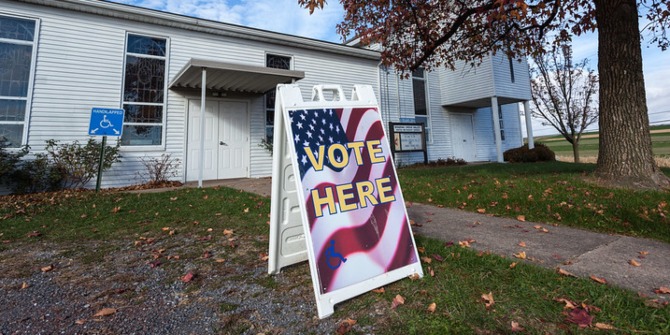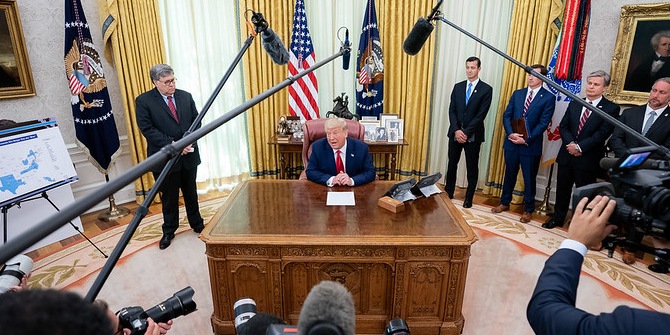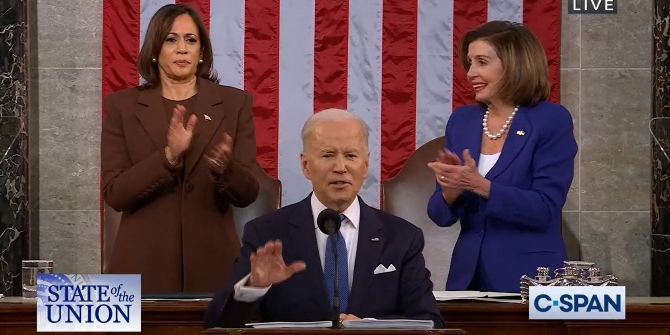 This past weekend, on the eve of Independence Day celebrations, President Trump took a divisive tone by attacking his opponents on the left. In this Q&A, Thomas Gift writes that Trump’s poor polling against his Democratic presidential challenger, former Vice President Joe Biden, and the ongoing criticisms of his handling of the COVID-19 pandemic, mean that he is likely to continue to hit out at opponents to galvanize his political base ahead of the election.
This past weekend, on the eve of Independence Day celebrations, President Trump took a divisive tone by attacking his opponents on the left. In this Q&A, Thomas Gift writes that Trump’s poor polling against his Democratic presidential challenger, former Vice President Joe Biden, and the ongoing criticisms of his handling of the COVID-19 pandemic, mean that he is likely to continue to hit out at opponents to galvanize his political base ahead of the election.
Trump made a high-profile speech in front of Mount Rushmore on July 3rd, the day before Independence Day. What did you make of his remarks?
Typically, when a US president makes a speech around a national holiday, the theme is uplifting—it’s about uniting Americans and finding common ground. Instead, against the backdrop of images of four American presidents and on the eve of America’s birthday, Trump took the opportunity to strike a divisive tone. He railed against “new far-left fascism,” lashed out at “Cancel Culture,” and mercilessly attacked opponents who he said are trying to “defame…[American] heroes.” Trump’s acerbic language is likely a harbinger of what we’ll see from the president between now and November, especially if he continues to lag in the polls. Expect Trump to go negative and to depict his challenger, former Vice President Joe Biden as beholden to the more extreme wings of the Democratic Party.
Many Trump critics have accused the president of turning his back on COVID-19 in the hopes that he can re-focus attention on other issues. Do you agree?
Trump isn’t ignoring the coronavirus, but he’s certainly searching for opportunities to deflect from the fact that the number of COVID-19 infections in the US has soared recently—reaching over 50,000 new cases for the first time last week. It’s too early to tell whether Trump can bounce back from his flagging performance of late, but he’s clearly been hurt politically in recent weeks, as evidenced by plummeting favorability numbers. Trump’s re-election team is well aware that the status quo isn’t working. So expect Trump to go on offense and try to change the conversation as much as possible to distract from his perceived mishandling of the coronavirus. That’s exactly what Trump did in his remarks at Mt. Rushmore, where he mentioned the pandemic just once.
The Trump administration has given conflicting signals recently on wearing facemasks to curb COVID-19 infections. Where does this controversy stand?
Trump did say last week that he’s “all for masks,” and Vice President Mike Pence recently made arguably his strongest statement in favor of wearing them. At the same time, Trump sets the tone from the top, and his personal refusal to wear a mask sets a regrettable example for many Americans. Mask-wearing has already become so politicized that it’s hard to see a modest change in rhetoric now by the White House being effective in convincing many more Americans to wear masks. That’s not to say it’s too little, too late. Anything the Trump administration can do to encourage compliance with guidelines from the Centers for Disease Control would be helpful. But the lack of strong leadership on this issue has put the US at a disadvantage in stemming the problem.
Trump suggested recently that the US economy is starting to turn a corner. Is that a fair assessment?
It’s definitely good news that the US labor market added jobs in June—about 4.8 million. Yet it’s important to keep in mind that unemployment is still over 11 percent—higher than it was at the worst peak of the Great Recession, and the economy has lost roughly 15 million jobs compared to February. Additionally, the June jobs figures were based on surveys that didn’t capture data from the end of the month. So with COVID-19 infections ticking up—and more localities re-imposing restrictions on businesses—it’s hard to see employment statistics improving considerably in the short to medium term. That’s especially true because the recent spike in COVID-19 cases could depress consumer spending even if shops, restaurants, and other businesses remain open.
How comfortable should Joe Biden feel about his current lead in the polls? How is Trump responding?
Although Biden enjoys a comfortable lead in the national polls—about 9 percentage points—it’s reasonable to expect this gap to narrow as we get closer to the election, as partisan allegiances get activated, and as campaigns go into turbo mode. With that said, Trump is clearly concerned. He’s in a tough position, however, because of the obvious trade-off between containing the coronavirus and prioritizing the economy. The more desperate Trump gets, and the more he sees himself being backed into a no-win corner, the more likely he is to ramp up not only personal attacks on Biden, but also his attacks on the credibility of the election results themselves. Indeed, we’ve already seen him laying this groundwork—for example, in questioning the integrity of mail-in ballots.
- These remarks are based in part on an interview by Thomas Gift on CNN Newsroom on July 4, 2020.
- Featured image: “Mount Rushmore Fireworks Celebration” by The White House is Public Domain.
Please read our comments policy before commenting.
Note: This article gives the views of the author, and not the position of USAPP – American Politics and Policy, nor the London School of Economics.
Shortened URL for this post: https://bit.ly/3gvPPyJ
About the author
 Thomas Gift – University College London
Thomas Gift – University College London
Thomas Gift is a Lecturer of Political Science at UCL, where he teaches on Public Policy Economics and Analysis and is the Director of the Philosophy, Politics, and Economics (PPE) Programme. He is also a Visiting Fellow at the LSE US Centre.






